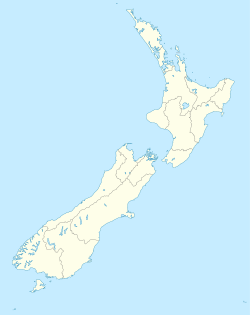Seymour Square, Blenheim
|
Blenheim Waiharakeke (Māori) |
|
|---|---|
| Main urban area | |

Blenheim pictured from the International Space Station (ISS)
|
|
| Coordinates: 41°30′50″S 173°57′36″E / 41.514°S 173.960°ECoordinates: 41°30′50″S 173°57′36″E / 41.514°S 173.960°E | |
| Country |
|
| Region | Marlborough |
| Territorial authority | Marlborough District |
| Named for | Battle of Blenheim |
| Member of Parliament | Stuart Smith, Kaikoura Electorate |
| Suburbs |
List
|
| Government | |
| • Mayor | John Leggett |
| Area | |
| • Total | 103.89 km2 (40.11 sq mi) |
| Population (June 2017) | |
| • Total | 31,300 |
| • Density | 300/km2 (780/sq mi) |
| Postcode | 7201 |
| Area code(s) | 03 |
Blenheim (/ˈblɛnɪm/) (Māori: Waiharakeke) is the most populous town in the region of Marlborough, in the north east of the South Island of New Zealand. It has an urban population of 31,300 (June 2017). The surrounding area is well known as the centre of New Zealand's wine industry. It enjoys one of New Zealand's sunniest climates, with hot, relatively dry summers and cool, crisp winters.
Blenheim is named after the Battle of Blenheim (1704), where troops led by John Churchill, 1st Duke of Marlborough defeated a combined French and Bavarian force.
The sheltered coastal bays of Marlborough supported a small Māori population possibly as early as the 12th century. Archaeological evidence dates Polynesian human remains uncovered at Wairau Bar to the 13th century. The rich sea and bird life of the area would easily have supported such small communities. As the Māori population of the area increased, they developed the land to sustain the growing population. In the early 1700s canals and waterways were dug among the natural river courses, allowing for the first forms of farming in the area including that of fish and native water fowl. A total of approximately 18 km of channels are known to have been excavated before the arrival of European settlers. Māori in the Marlborough Region also cultivated crops, including kumara (sweet potato).
The area is also home to the first serious clash of arms between Māori and the British settlers after the signing of the Treaty of Waitangi. The Wairau Affray which occurred in what is now the village of Tuamarina.
...
Wikipedia

